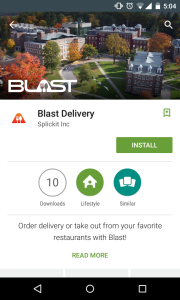The future of delivery in Hanover has arrived. It’s called BLAST. Students from major urban areas may be familiar with delivery and app-based ordering services such as Postmates, Grubhub, and Seamless. BLAST looks to institute a similar infrastructure in Hanover, offering delivery from local institutions like Lou’s, CVS, EBAs, and any other business that is looking for an efficient way to get their goods to Dartmouth students.
The driving force behind BLAST is Justin Harvey, a computer science major, who brought the idea to his friends Alec Dunn, CJ Murphy, and David Sher, three other 17s who all had specific skills he saw as beneficial to his startup. We had the opportunity to meet with Justin, Alec, and David, and they shared their recent entrepreneurial experience with us.
What sparked the idea, Harvey says, was a simple problem here on campus. “The problem that students face,” he explains, “is that restaurants that are three minutes away either take 45 minutes to deliver, or don’t deliver at all.” The core of the idea is aggregated ordering through a mobile app and aggregated delivery through a unified network of drivers. The team pointed out that “Aggregating delivery into a third-party service not only increases delivery efficiency for all restaurants, but also reduces costs.” Further, because multiple establishments and restaurants will be using the same cars, peak and dead hours will not be experience by drivers. Instead, they will have more consistent work throughout the day. Though at the moment BLAST is limited to a handful of Hanover businesses, the sophomores see BLAST achieving its full capacity of services by the end of this term.
The founders have a substantial vision for BLAST. When asked about expansion, the three shared that “Our ultimate goal is to expand to other campuses in similar locations by licensing this concept to like-minded students across the country.” Their ambitions even included a possible partnership with DDS, where students could use DBA to order food from the Hop and Collis. However, they realize that they may face serious difficulties in penetrating the dense managerial opacity of the obstinate organization.
Many entrepreneurs on Dartmouth’s campus have probably experienced difficulties in time management, and for these 17s, it has been no different. According to the sophomores, “In the beginning, BLAST entailed a lot of meetings and brainstorming, and the actual implementation process has presented a serious challenge.” Justin, BLAST’s main programmer, has been so committed to this project that he is currently using his sophomore winter as an off term so he can dedicate time toward cultivating the app to meet its potential. Likewise, Dunn has run into issues. “I don’t want to sacrifice my grades, but I want BLAST to be as successful as possible.”
In order for BLAST to reach its optimal functionality, there is another challenge that the founders say they must face. “It’s difficult getting people used to change. They have to break their old habit of picking up the phone and calling EBAs, and instead move to an app-based ordering platform.” If these enterprising students can satiate both their appetite for success and the campuses for delivery dining options, people on both the ordering and delivery sides of the equation will reap the maximum benefits.
Some may find it surprising that a delivery service could flourish in such a small market, but the 17s experienced the opposite. “The isolated community has allowed just enough business to start a company without competition.” Additionally, the three cited help from Dartmouth’s various entrepreneurial resources, such as the Dartmouth Entrepreneurial Network (DEN), saying that “Dartmouth’s resources have been extremely beneficial to the startup process. We received a lot of support from the DEN, which gives out small grants. We have also been working with the Green D Fund, an angel investor fund for companies that are relatively young and Dartmouth based.” Beyond these structured resources for people with entrepreneurial visions, the team also drew on the expertise of Dartmouth’s famously helpful and attentive professors, citing their invaluable advice as key to getting BLAST off the ground.
Not only do its founders feel BLAST provides an invaluable service here on campus, but they also see BLAST as a message to other students. The three are in agreement that “This idea can show other people that by using the support Dartmouth offers, a company like BLAST can become a reality.”
When asked to reflect on their experience so far, the 17s came to the conclusion that “A lot of people hear ‘startups’ and get a negative connotation that people at the heads of these startups are all about money. The goal here is not necessarily money; we are trying to solve a problem on campus. BLAST isn’t for us, it is for our customers. With support from the student body, we could really do something special.”
George W. Easley also contributed to this report.


Be the first to comment on "A Conversation with BLAST"